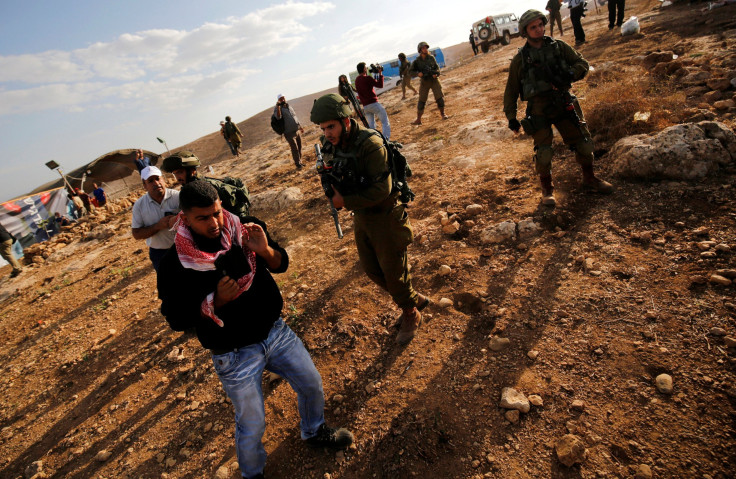Israel, Palestine Conflict: In West Bank, Israelis Freely Enter Palestinian Cities; Some Settlers Facing Evacuation

Tensions between Israeli settlers and Palestinians on the West Bank remain high, but Israelis are rarely challenged when they enter Palestinian villages despite signs saying no Israelis allowed. At the same time, a pro-Palestinian organization in Scotland has accused Israel of ethnic-cleansing in the West Bank to try to establish a Jewish-only community.
“We usually urge Palestinians who have Israelis visiting them to report this to the Palestinian security forces to provide them with protection if needed, but for the most part, the suggestion is ignored,” a security officer said in the Wednesday edition of Gulf News.
Some Palestinians want the Palestinian Authority to treat Israelis the same way Israel treats Palestinian visitors, requiring them to get permits before they can enter Palestinian cities. Palestinians caught without permits inside Israel’s 1948 borders are held until the end of the work day and then required to sign a pledge now to enter illegally again before they are released at a border crossing.
“The gates of Palestinian cities are wide open, welcoming Israelis to enter at any moment, but this is not the case for Palestinians entering Israel,” said Ahmad Abu Sha’ar, a Palestinian who has been trying to win a work permit.
Signs are posted at the entrances to Palestinian cities banning entry of Israeli citizens, but they generally are ignored.
Some 200,000 Palestinians cross into Israel daily to work, shop or seek medical treatment.
The Scottish Palestine Solidarity Campaign last week accused Israel of trying to shift the demographic balance in the West Bank. Mick Napier, an activist with the campaign told Iran’s state-owned Press TV Israel is demolishing Palestinian homes to make way for Jewish settlements.
More than 500,000 Israelis live in 230 West Bank settlements built since 1967. The Israeli Knesset currently is considering legislation that would legalize 4,000 settler homes on private Palestinian lands along with compensation for the landowners.
Palestine Liberation Organization Secretary-General Saeb Erekat has warned there will be consequences of the bill is adopted.
Not all settlements would be legalized, however. The Supreme Court has ordered the settlement of Amona evacuated on Christmas. It is the largest of 100 settlements erected without government permission across the West Bank and has become a symbol of settler defiance.
The settlement was built in the 1990s on private Palestinian land and consists of 50 mobile homes on a grassy hilltop.
“We are working overtime to find a responsible solution to the issue of Amona and for similar cases in the future,” Netanyahu told the weekly Cabinet meeting Sunday. “We must act responsibly and prudently here for a common goal: to defend settlements, and to defend the court.”
© Copyright IBTimes 2024. All rights reserved.





















